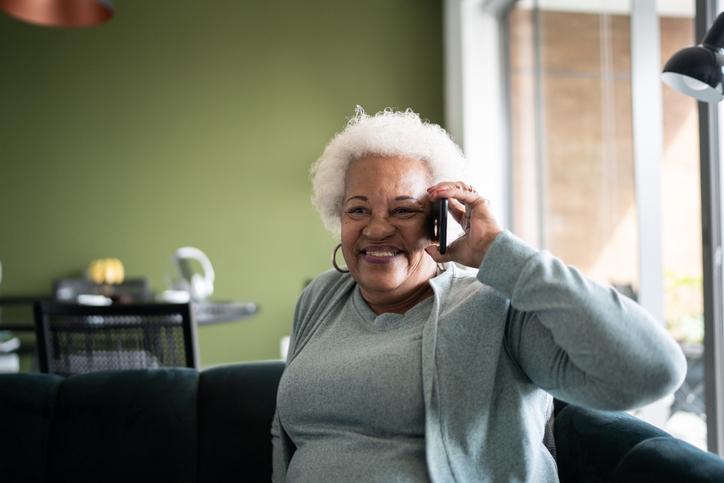A Few Phone Calls From Trained Volunteers Can Make a Difference for People with Depression
New research finds that volunteers who make a few empathetic phone calls can significantly improve others’ loneliness and depressive symptoms among adults. This type of program could help address the significant shortage of mental health professionals and improve mental healthcare, the study authors suggest.
Participants from a randomized controlled trial were analyzed to assess the impact of a telephone support program on mental health. The program, set up in response to the COVID-19 pandemic, involved telephone calls from a group of trained volunteers to individuals receiving services through a local Meals on Wheels program. The original assessment found significant improvements in loneliness and a further analysis found significant benefits for people with depression symptoms. The research team from the University of Texas at Austin included Maninder K. Kahlon, Ph.D., Nazan Aksan, Ph.D., and Rhonda Aubrey, M.H.I.

The callers were ages 17–23 and received two hours of training, including how to listen and ask questions. Each study participant received one call per weekday for the first week. The callers then asked whether they wanted to continue or reduce the frequency of calls; a majority (58%) stayed at five calls per week, and the rest reduced the number of calls to two or three per week. Participants were assessed at the beginning and at four weeks for depression, anxiety, loneliness, and isolation.
The study looked specifically at a subgroup of the participants who had depressive symptoms at the outset. After four weeks of the telephone program, participants who received the phone calls had greater improvement (statistically significant) in depression symptoms compared to participants in the control group. In addition, participants’ perception of isolation or loneliness improved among those receiving calls compared to the control group. Anxiety, general mental health and objective measure of isolation did not change.
The findings from this post hoc subgroup analysis showed that after four weeks, thephone calls meaningfully decreased symptoms of depression and loneliness among participants who had clinically relevant symptoms of depression at baseline.
Helping address the mental healthcare professional shortage
The country is facing a shortage of mental healthcare clinicians that is expected to continue for some time. The authors note that this type of layperson-delivered program offers “the opportunity to expand psychiatric workforce capacity and improve the mental health of patients.”
More than 150 million people in the U.S. live in federally designated mental healthcare professional shortage areas and within the next couple of years, the anticipated shortage of psychiatrists is more than 14,000. As with healthcare services overall, use of telehealth for mental healthcare increased access to care during the pandemic and use of telehealth for mental health continues to remain high post-pandemic. Research presented last week at the APA Annual Meeting found that less than one in five psychiatrists is taking new patients and the average wait time for an in-person appointment was 67 days and even for a telepsychiatry appointment it was 43 days.
“This simple intervention holds promise in reducing the burden of a clinical care system in improving clinically significant elevations in depression as well as other indicators of mental health,” the authors conclude. This type of layperson program could not only address mental health workforce gaps but also might feel less threatening to potential clients and bring more people into care, and could allow for the callers to notice changes over time and to refer the individual to professional services if needed.
Photo credit: iStock, FG Trade
References
- Kahlon, M.K., Aksan, N., Aubrey, R. (2023) Effect of a Layperson-Delivered Telephone Program for People With Depressive Symptoms. American Journal of Psychiatry. https://doi.org/10.1176/appi.ps.20220440
- Aksan, N. Kahlon, M. Aubrey, R. (2023). Efficacy of layperson-delivered empathetic telephone-based program for those with symptoms of depression: A Post-Hoc Analysis of a Clinical Trial. Poster presented at the 2023 APA Annual Meeting, San Francisco.
- Lo, J., et al. 2022. Telehealth Has Played an Outsized Role Meeting Mental Health Needs During the COVID-19 Pandemic. Kaiser Family Foundation. Published: Mar 15, 2022
- Satiani, A., Niedermier, J., Satiani, B., & Svendsen, D. P. (2018). Projected Workforce of Psychiatrists in the United States: A Population Analysis. Psychiatric services (Washington, D.C.), 69(6), 710–713.
